| |||||
| Decades: | |||||
|---|---|---|---|---|---|
| See also: | |||||
The following lists events that happened in 1971 in Iceland .
| |||||
| Decades: | |||||
|---|---|---|---|---|---|
| See also: | |||||
The following lists events that happened in 1971 in Iceland .
| | This section needs expansion. You can help by adding to it. (July 2016) |


Iceland is a Nordic island country between the North Atlantic and Arctic Oceans, on the Mid-Atlantic Ridge between North America and Europe. It is linked culturally and politically with Europe and is the region's most sparsely populated country. Its capital and largest city is Reykjavík, which is home to about 36% of the country's roughly 380,000 residents. The official language of the country is Icelandic.

The politics of Iceland take place in the framework of a parliamentary representative democratic republic, whereby the president is the head of state, while the prime minister of Iceland serves as the head of government in a multi-party system. Executive power is exercised by the government. Legislative power is vested in both the government and the parliament, the Althingi. The judiciary is independent of the executive and the legislature.

The economy of Iceland is small and subject to high volatility. In 2011, gross domestic product was US$12 billion, but by 2018 it had increased to a nominal GDP of US$27 billion. With a population of 387,000, this is $55,000 per capita, based on purchasing power parity (PPP) estimates. The 2008–2011 Icelandic financial crisis produced a decline in GDP and employment that has since been reversed entirely by a recovery aided by a tourism boom starting in 2010. Tourism accounted for more than 10% of Iceland's GDP in 2017. After a period of robust growth, Iceland's economy is slowing down according to an economic outlook for the years 2018–2020 published by Arion Research in April 2018.

Ólafur Ragnar Grímsson is an Icelandic politician who was the fifth president of Iceland from 1996 to 2016. He was previously a member of the Icelandic Parliament for the People's Alliance and served as Minister of Finance from 1988 to 1991.

Menntaskólinn í Reykjavík is a junior college in Iceland. It is located in Reykjavík.
Áramótaskaupið is an annual Icelandic television comedy special, broadcast on New Year's Eve by the state public service broadcaster RÚV. Initially aired on radio in 1948, and later moving to television in 1966, it features sketches satirizing the news events of the past year.

The People's Alliance was an electoral alliance in Iceland from 1956 to 1968 and a socialist political party from 1968 to 1998.

Southern Peninsula is an administrative unit and part of Reykjanesskagi, or Reykjanes Peninsula, a region in southwest Iceland. It was named after Reykjanes, the southwestern tip of Reykjanesskagi.
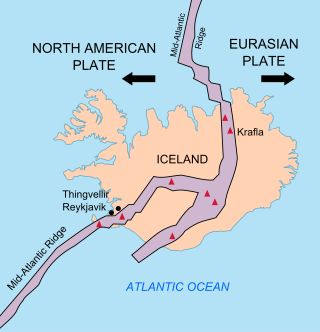
The geology of Iceland is unique and of particular interest to geologists. Iceland lies on the divergent boundary between the Eurasian plate and the North American plate. It also lies above a hotspot, the Iceland plume. The plume is believed to have caused the formation of Iceland itself, the island first appearing over the ocean surface about 16 to 18 million years ago. The result is an island characterized by repeated volcanism and geothermal phenomena such as geysers.
Parliamentary elections were held in Iceland on 13 June 1971. Although the Independence Party remained the largest party in the Lower House of the Althing, winning 15 of the 40 seats, Independence Party leader Jóhann Hafstein resigned as Prime Minister the day after the elections as his party and its coalition partners had failed to win a majority of seats. Ólafur Jóhannesson of the Progressive Party succeeded him as Prime Minister, announcing the formation of a new coalition government on the same day. The new government's programme included expanding Icelandic fishing borders from 19 to 80 kilometers and gradually closing down Naval Air Station Keflavik but remaining committed to NATO membership.

Iceland is a world leader in renewable energy. 100% of Iceland's electricity grid is produced from renewable resources. In terms of total energy supply, 85% of the total primary energy supply in Iceland is derived from domestically produced renewable energy sources. Geothermal energy provided about 65% of primary energy in 2016, the share of hydropower was 20%, and the share of fossil fuels was 15%.

The Icelandic Ministry of Finance is responsible for overseeing the finances of the Icelandic government. The Minister for Finance and Economic Affairs is Þórdís Kolbrún R. Gylfadóttir.

The following outline is provided as an overview of and topical guide to Iceland:
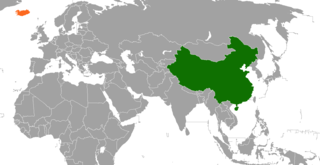
China–Iceland relations formally began on 8 December 1971, when Iceland recognised Beijing. Prior to the signing of a Free Trade Agreement between the two countries in 2013, diplomatic activities between them were relatively few in number. However, since this event, political cooperation has increased. There is growing number of economic and cultural ties, as their political partnership has expanded.

Iceland–Mexico relations are the bilateral relations between Iceland and the United Mexican States. Both nations are mutual members of the Organisation for Economic Co-operation and Development, United Nations and the World Trade Organization.
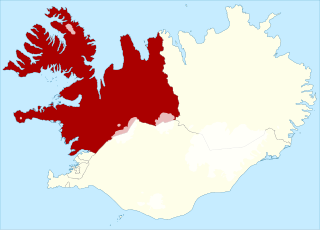
Northwest is one of the six multi-member constituencies of the Althing, the national legislature of Iceland. The constituency was established as Northwestern in 1959 following the nationwide extension of proportional representation for elections to the Althing. It was renamed Northwest in 2003 when the Western and Westfjords constituencies were merged into the Northwestern constituency following the re-organisation of constituencies across Iceland. Northwest consists of the regions of Northwestern, Western and Westfjords. The constituency currently elects seven of the 63 members of the Althing using the open party-list proportional representation electoral system. At the 2021 parliamentary election it had 21,541 registered electors.
Útrásarvíkingur is a neologism coined during the early twenty-first century Icelandic banking boom as a term for Icelandic financiers who rose to prominence with a string of high-profile, credit-fuelled purchases of European businesses. The concept that it denotes, which imagines the financier as a modern-day Viking, has been the subject of extensive scholarly research investigating its relationship with Icelandic nationalism and the causes of the 2008–2011 Icelandic financial crisis.
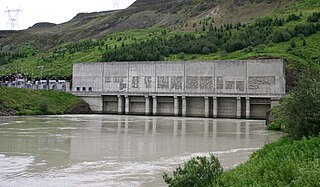
The Búrfell hydroelectric power plant is a run-of-river hydroelectric power plant located in the Þjórsá valley in southwest Iceland. It is operated by Landsvirkjun. It was, since its construction in 1969, until the construction of the Kárahnjúka power plant in 2008, the largest power plant in Iceland with a capacity of 270 MW.
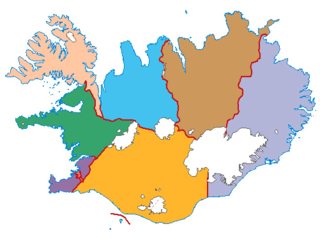
Reykjavík was one of the multi-member constituencies of the Althing, the national legislature of Iceland. The constituency was established in 1844 when the Althing was converted into a consultative assembly. It was abolished in 2003 when the constituency was split into two constituencies following the re-organisation of constituencies across Iceland. Reykjavík was conterminous with the municipality of Reykjavík.